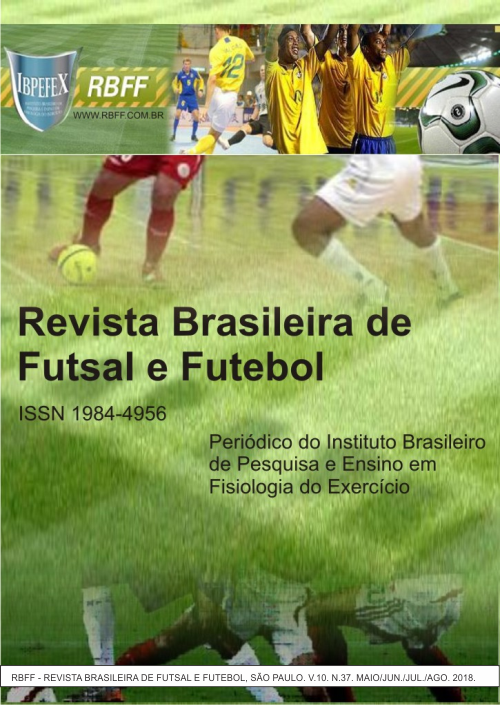Effects of a functional training program in physical qualities of futsal athletes
Keywords:
Functional training, Futsal, Physical capabilitiesAbstract
Physical training is based on a consistent and safe prescribing exercises that allow the simulation of the human body in a way able to develop all the qualities of the musculoskeletal system, such as speed, strength, body balance coordination, flexibility, laterality, cardio endurance and neuromuscular besides maintaining the center of gravity of the body. Futsal is a sport that has growth most in recent years, the sport has characteristic physical effort of high intensity and short duration, which does need a good physical preparation. Among the important physical abilities in futsal are agility, speed, flexibility, power of lower limbs and abdominal strength. An experimental research with a quantitative approach was carried out in order to verify the influence of functional training in physical abilities used for futsal players. For this the following protocols were used: 20-meter shot for speed; standing long jump test for potency of the lower limbs; Wells bank for flexibility; Semo test for flexibility; abdominal muscle endurance test. Statistical analysis Student t test for dependent data, which was adopted a significance level of p ≤0,05 was adopted. This study was conducted with 10 volunteers (age 15.33 ± 0.5 years, it lasted 3 months functional training being performed twice a week. The results were statistical improvement in physical abilities of abdominal strength, flexibility, agility, speed and power of the lower limbs. We conclude that a functional training program influences the improvement of the physical capabilities of futsal.
References
-Alves, L.S.; Borba, D.A.; Ferreira Junior, J. B.; Martini, A.R.P.; Coelho, L.G.M. O Desempenho no teste de ShuttleRun com e sem bola melhora após a partida de futsal em jovens de 14 a 16 anos de idade. Revista Digital. Vol. 15. Num. 145. 2010.
-Alvarez, J.C.B; Alvarez, V.B. Relación entre el consumo máximo de oxígeno y la capacidad para realizar ejercicio intermitente de alta intensidade em jugadores de Fútbol Sala. Revista Futsal Coach. Vol.7. Num. 2. 2003. p. 13-24.
-Campos, M. A.; Coraucci Neto, B. Treinamento Funcional Resistido: Para Melhoria da Capacidade Funcional e Reabilitação de Lesões Musculoesqueléticas. Rio de Janeiro. Revinter. 2004.
-Catellan, A.V.; Mota, C.B. Estudo das técnicas de alongamento estático e por facilitação neuromuscular proprioceptiva no desenvolvimento da flexibilidade em jogadores de futsal. Kinesis. Num. 28. 2003. p. 53-67.
-Cyrino, E. S.; Altimari, L.R.; Okano, A.H.; Coelho, C.F. Efeitos do treinamento de futsal sobre a composição corporal e o desempenho motor de jovens atletas. Revista Brasileira de Ciência e Movimento. Brasília. Vol. 10. Num. 1. 2002. p. 41-46.
-D’elia, R.; D’elia, L. Treinamento funcional: 6º treinamento de professores e instrutores. São Paulo. SESC. Serviço Social do Comércio, 2005.
-Gelatti, P. O gladiador do futuro. Combat Sport. São Paulo. Num. 46. 2009. p. 12-14.
-Melo, P.R. O futsal: influência no desenvolvimento corporal e aspectos formativos do adolescente. Monografia. Universidade de Brasília. Brasília. 2013.
-Monteiro, A.; Carneiro. T. O que é Treinamento Funcional? 2010. Disponível em: <http://www.arturmonteiro.com.br/2010/04/o-que-e-treinamento-funcional/>Acesso em 23/04/2012.
-Novaes, J.; Gil, A.; Rodrigues, G.; Condicionamento físico e treino funcional: Revisando alguns conceitos e posicionamentos. Revista Uniandrade. Rio de Janeiro. Vol. 15. Num. 2. 2014. p. 87-93.
-Oliveira, L. C. Os efeitos do treinamento de força sobre a potência e velocidade em atletas de futsal da categoria adulto masculina. 2013. Monografia Pós-graduação. Universidade Gama Filho. Goiânia. 2013.
-Santini, J; Voser, R.C. Ensino dos esportes coletivos: uma abordagem recreativa. Canoas. Ed. Ulbra. 2008
Downloads
Additional Files
Published
How to Cite
Issue
Section
License
Authors who publish in this journal agree to the following terms:
- Authors retain the copyright and grant the journal the right of first publication, with work simultaneously licensed under the Creative Commons Attribution License BY-NC which allows the sharing of the work with acknowledgment of the authorship of the work and initial publication in this journal.
- Authors are authorized to enter into additional contracts separately for non-exclusive distribution of the version of the work published in this journal (eg, publishing in institutional repository or book chapter), with acknowledgment of authorship and initial publication in this journal.
- Authors are allowed and encouraged to post and distribute their work online (eg, in institutional repositories or on their personal page) at any point before or during the editorial process, as this can bring about productive change as well as increase impact and impact. citation of published work (See The Effect of Free Access).


